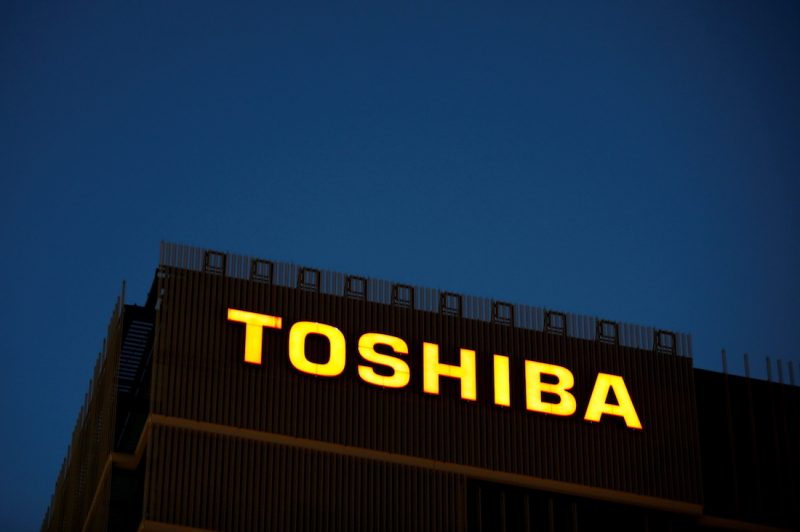Bidders are weighing offering around 7,000 yen, or $51.41, per share to take Japanese conglomerate Toshiba private, valuing the deal at $22 billion, according to people familiar with the talks.
Toshiba shares rose 5.3% in Tokyo early on Thursday, outperforming a 0.8% rise in the benchmark Nikkei average.
The company said earlier this month that it had received eight buyout proposals and two for capital alliances that would want it to remain listed.
The Toshiba bidders are discussing an offer price range of up to 7,000 yen a share with Toshiba’s shareholders, the people said, representing up to a 27% premium to Toshiba’s share price of 5,501 yen as of Wednesday’s close.
A separate source said the range of offers was wide and various conditions have been attached.
The offer price, if finalised, would value the chips-to-nuclear-reactors conglomerate at 3 trillion yen ($22 billion) at top end of the range.
Toshiba said it would not disclose details of the proposals.
Many Bidders
KKR & Co, Baring Private Equity Asia, Blackstone, Bain Capital, Brookfield Asset Management, MBK Partners, Apollo Global Management and CVC Capital Partners have submitted initial bids, according to the people.
Some of them may form consortia for a bid, they added.
Bain, Blackstone, Brookfield, Baring, CVC, KKR and MBK declined to comment. Apollo did not immediately respond to a request for comment.
Domestic funds, including Japan Investment Corp (JIC), and a number of strategic players are looking to see how they can participate in the deal, the people said. JIC declined to comment.
Weak Yen
If successful, the Toshiba deal would be the largest buyout transaction in Japan since a consortium led by Bain took private the conglomerate’s memory chip unit, Kioxia, for $18 billion in 2018.
The discussions are taking place at a time when a weak yen continues to haunt the Japanese economy, threatening to disrupt Japanese firms’ business plans and turn them into attractive acquisition targets for foreign buyers.
The yen plunged to a new 24-year low of 136.71 per dollar early on Wednesday.
Bain ‘Advantage’
Of all the potential Toshiba bidders, Bain has been “very aggressive” in pushing for a buyout, two of the sources said.
A Japanese investment banker with knowledge of the deal separately said even at 6,500 yen per share the valuation for Toshiba seemed “too stretched”.
Ultimately, he said, the price would have to take into account how investors value Toshiba’s 40% stake in unlisted chipmaker Kioxia.
That gave Bain an advantage over other bidders, he said, because the private equity firm owned the bulk of Kioxia, meaning it would decide the fate of the chipmaker, which in turn would impact the valuation of Toshiba.
Bedevilled by accounting and governance crises since 2015, Toshiba set up a special committee in April to solicit proposals after shareholders voted down a management-backed restructuring plan.
The company said earlier it would shortlist bidders for due diligence after its annual shareholders’ meeting on June 28.
- Reuters with additional editing by Jim Pollard
ALSO READ:
Japan’s Toshiba Seeks Fresh Blood With Board Nominees
Toshiba Shares Jump After Buyout Put Back on Table
Toshiba Shares Jump as Investors Bet on Private Equity Interest
Kioxia Plans Flash Memory Chip Facility in Japan With WDC
























